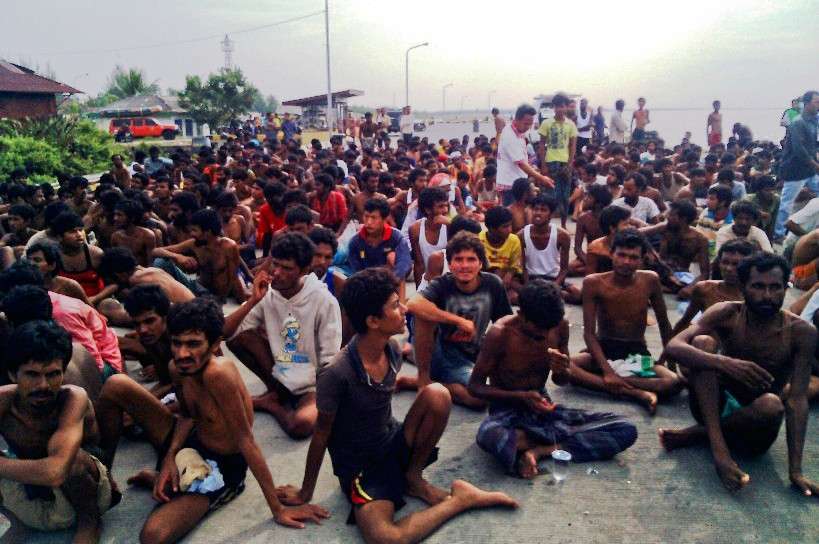On May 19, Jesuit Refugee Service Asia Pacific issued a statement calling for Southeast Asian nations and the global community to respond to the suffering of the Rohingya people who have been fleeing Myanmar in unprecedented numbers in recent weeks. Thousands did so by boat and were stranded at sea after being turned away by Malaysia, Thailand, and Indonesia. However after emergency talks on May 20, Indonesia and Malaysia agreed to take in 7,000 of the Bangladeshi migrants and Rohingya refugees who have been stranded in the Andaman Sea for weeks, while Thailand has agreed to stop driving away boats that come ashore. A regional conference on the issue will be held in Bangkok on May 29.
We publish below the statement from Jesuit Refugee Service Asia Pacific.
(Bangkok) 19 May 2015 — Hospitality and solidarity are two principle human values expressed in human interaction and deeds, especially towards those in dire needs and those marginalised. The people in the Asia Pacific region have a long tradition manifested in social and religious values. Globally these values are cemented in international norms and standards on how to treat people in distress like the Rohingya people experiencing now in their odyssey to safety. It is time for the ASEAN and global community to recall these values and norms when deciding how to respond to the suffering of the Rohingya people approaching the shores of ASEAN nations. The protection of lives as a core human right should be prioritized over any other interests or scenario. I would like to repeat what Pope Francis once said “I beg the Lord to grant us more politicians who are genuinely disturbed by the state of society, the people, and the lives of the poor.” – Fr Bambang A Sipayung SJ
Jesuit Refugee Service Asia Pacific is deeply concerned on the rapidly deteriorating situation the Rohingya are facing in the region over the last years. The failure of governments in Indonesia, Thailand, Malaysia and Myanmar to adequately respond to their current plight is a human tragedy – and a sign that governments are detached from the values deeply embedded in the cultures, society and religions of ASEAN countries.
Hospitality matters immensely, especially for vulnerable women, children and those who are on their journey to find safety. Countries failing to allow people to disembark from ill-equipped vessels and ensuring access to their right to seek asylum have jeopardized the value of hospitality for those in dire need.
In this very moment we are creating a precedent on how we deal with people in distress, asking for our help in maybe their darkest hours. It is in this moment that ordinary people have shown hospitality and solidarity in preventing death at sea like the fishermen bringing to shore the stalled boats, even when their military are pushing them back out to sea. It is these fishermen and communities extending their support and welcome to Rohingya people after months at sea that is a strong symbol that these values are alive and give reason for hope.
ASEAN governments and leaders should follow this important example by addressing the Rohingya’s immediate needs for protection and start to develop a long-term vision on how to end their plight after decades of deteriorating suffering. Now is the time to call into action the protection-sensitive regional approach, which was envisaged in the Jakarta Declaration of 2013, and redefine ASEAN as a community. Using resources to save lives is needed, not extending consistent rejection experienced by one of the most persecuted people of our times.
JRS AP welcomes an initiative to hold a joint meeting at the end of this month to address this crisis and to find a coordinated solution. We urge everyone participating in this meeting to observe the values of hospitality, solidarity, and justice as pillars of a protection-sensitive regional approach. As only by acknowledging and addressing the plight of the Rohingya people will we be able to find a way to address the root causes of their suffering.
*** end of statement ***
Photo caption: Rohingya refugees wait with uncertainty after arriving by boat to Langsa, East Aceh, Indonesia on 15 April 2015 (Nasruddin FPRM)
Related story: The need for a compassionate refugee policy







